NOTE: Please be aware that my feelings and stance have changed since I wrote this blog post many moons ago. You can find some of my more recent thoughts in the comments.
I am not a huge fan of The Next Generation, despite what my Pez dispenser and TNG comic collection might tell you. I haven’t seen every episode yet, but I’ve watched four seasons and I find it difficult to get through at times. I understand the appeal this show has for a lot of people, but many of the episodes are bogged down by meetings and negotiations. The Original Series, while also having meetings and plenty of talky moments, felt more balanced. This may have something to do with Kirk’s ability to challenge and oftentimes defy the Prime Directive, which leaves room for more action and conflict. Despite my somewhat negative outlook of the show, it is still great to analyze and discuss its plots and hit-or-miss attempts at social commentary. The episode I’m reviewing now, titled “The Loss,” is one that stuck out to me because of its weak attempt at disability discourse, and its ability to make my indifferent feelings about Troi switch to complete disgust in only 42 minutes.
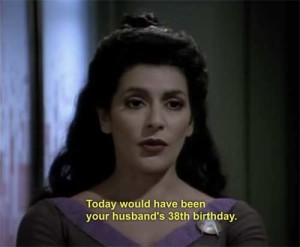
The episode opens with Ensign Brooks in a counseling session with Troi. Brooks recently lost her husband, and seems to be in a state of denial. Troi reminds her that it would have been her husband’s 38th birthday, and shows her a music box she’s saved that belonged to him. Brooks breaks down and cries on Troi’s shoulder.
Cut to the bridge. Worf picks up something on the sensors that quickly disappears, and Data is unable to see anything with his equipment. As this is going on, Troi says goodbye to Brooks, and suddenly clutches her head in pain. She enters her room and passes out on the couch. And then…
SPACE! THE FINAL FRONTIER! You know the rest. The opening credits are the best (and least rage-inducing) part of this episode. That should tell you something about where I’m going with this review.
Picard orders Data to resume course to T’lli Beta because there is nothing showing up on the sensors. As soon as he says “Engage!”, the ship jolts and is unable to enter warp. They go to a full stop and yellow alert, but the Enterprise begins moving again – albeit very slowly. Some unknown force is pulling them along. After a failed attempt at breaking free, Data suggests immediate shutdown and Picard does his infamous “Make it so!” They continue to be pulled in the same direction and at the same speed.
Back in Troi’s room, we see her wake up and call Dr. Crusher. She says she feels dizzy, but isn’t sure what happened. After dealing with a few other crew injuries, Crusher arrives and wants to run an internuncial series on her in sick bay. She’s still clearly in distress, so medical scans are probably a good idea.
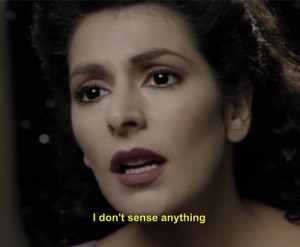
MEETING TIME! My favorite part of every TNG episode. Picard asks Troi if she can sense any life forms out there, and she says she senses nothing. Picard tells her that it’s alright, and maybe there is nothing to sense. Troi responds: “No, you don’t understand. I don’t sense anything – not out there, not in here. All of you, you’re all blank to me!” She’s lost her empath abilities. This is where the episode really starts to go downhill.
We’re in the sick bay now, after Crusher has run that internuncial series on Troi. She found some brain damage, but she isn’t sure how to treat it yet. Troi says the Betazoid brain has a “remarkable ability to heal itself,” and maybe things will just reverse. Crusher doesn’t want to give her false hope, to which Troi says “It’s just hope, Beverly, not false hope.” The conversation continues:
Crusher: “It’s no different than one of us suddenly going blind.”
Troi: “You don’t have to tell me, Beverly, I understand the psychology.”
C: “You may understand it, but you’ve never had to live with it.”
T: “I may be perfectly fine tomorrow.”
C: “And you may not.”
Troi becomes indignant after Crusher recommends that she talk to one of the psychologists on board, and she says she will do so if she feels the need. I’m guessing this scene is supposed to be representative of the denial and/or hope that some newly disabled people go through. I didn’t care for Crusher’s “It’s no different than one of us suddenly going blind,” because NO, IT IS DIFFERENT. I understand what they are getting at: that she’s lost an ability she once had, not unlike someone losing their eyesight. But the difference is that Troi can still comfortably access society and function “normally” within it. The fact that she’s lost her empath abilities does not stop her from benefiting as an able-bodied/minded individual. Someone who is blind, on the other hand, does not have that benefit. If Geordi didn’t have his visor, he would not be able to function in his job; he must adapt, rather then his surroundings adapting to him. As much as this episode wants me to look at Troi as disabled, I just can’t buy it – because she is still benefiting from her privileges, no matter how she feels. That isn’t to say I don’t understand some level of frustration she must be feeling, but for the show to compare it to disability does the disability community a disservice. Maybe the point they were trying to make would have been more effective if this episode took place on Betazed, where everyone is telepathic.
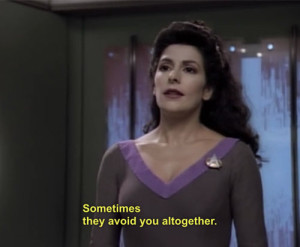
Riker goes to see Troi, and asks her in a concerned voice if she wants to talk. This upsets her, and she says: “You know what the worst part of this is? And I’ve seen it happen to so many patients…The way other people change. How they start to treat you differently. They walk on eggshells around you. Sometimes they avoid you altogether. Sometimes they become overbearing – reach out a helping had to the blind woman…I will not be treated that way!” Riker says he’s never seen her so scared, and she says she’s fine; if she gets better, she gets better, and if she doesn’t, she’ll “adapt” because “life goes on.” Clearly, this is bothering Troi more than she lets on. I can relate to what she is saying, because many people walk on eggshells around me, avoid me, are scared to talk to me – but it feels wrong for her to say those words. She’s lost her empath abilities for what, a few hours? And suddenly she has insight into the life of a disabled person? Also, stop comparing yourself to being blind, especially when there is an actual blind person on the crew. I find it curious that the show is acknowledging that ableism exists in this world, but then tries to get the audience to buy that a perfectly able-bodied/minded individual is disabled. Through the show, she is speaking for a community that often has their own words silenced by the non-disabled, and that bothers me. Here is an abled person speaking on behalf of a people that can speak for themselves; we don’t need another pseudo-disabled mascot to tell our stories.
Later, we see Troi with Ensign Brooks again, who says she feels better because she listened to the councilor’s advise – she let herself go and gave in to her true emotions about her husband’s death. Troi explains about the loss of her empath abilities, because she thinks it’s important that her patients know this. Alright, fair enough, though it’s clear that her abilities had nothing to do with the help the Ensign received from her counseling session.
ANOTHER MEETING! A probe that Geordi and Data sent out revealed that there are small life forms surrounding the ship, and they are on a two-dimensional plane – this is why the crew could not detect them earlier. Picard wants to know how these beings have access to a three-dimensional world, but his question is quickly swept under the rug when Geordi says it’s a shame that they can’t tell whether or not they are sentient. This offends Troi (are we surprised?), because she takes it as a personal attack on her lost abilities. They really should address Picard’s question, but they never do – even the writers of the show can’t figure out the science.
In the next scene, Troi is rushing into sick bay in a panic, and telling Crusher she must help her. Crusher tells her the tests have been inconclusive and there’s nothing she can do now. That’s when the shit hits the fan.
T: “How do you people live like this?”
C: “We get by pretty well, actually, and so will you – in time.”
T: “You have no idea – no idea – what this is like. How can you know what it’s like to lose something you never had?”
C: “I don’t claim to.”
T: “And yet you’re telling me that I’m supposed to get used to it.”
C: “If our positions were reversed, what would you tell me?”
T: “If our positions were reversed, I wouldn’t have been in here treating skinned elbows while you were lying passed out on your office floor. I’d have been there a lot sooner, perhaps in time to prevent this from ever happening!”
Troi angrily walks back to her room, where she falls to her knees and begins to cry. Another attempt by the show to portray the anger that some disabled people feel toward the non-disabled, especially those who say “you’ll get used to it” – which is valid. But again, I think they fail here because it just comes across as Troi being really pissy and mean because she’s frustrated.
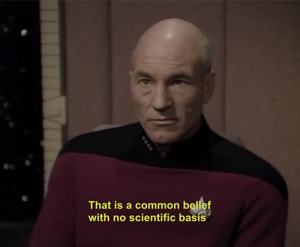
After the commercial break, we have Troi in Picard’s ready room. She says she’s been in denial, and wants to resign as councilor because she can’t fulfill her obligations. Picard tells her that empath abilities are not required for her position, but she says they are for her. Their conversation continues:
P: “I’m sure that after a while, you’ll be able to adjust. They say when one loses a sense, the other senses become stronger to compensate. A blind man develops better hearing…”
T: “With all due respect, Captain, you don’t know what you’re talking about. That is a common belief with no scientific basis, no doubt created by normal people who felt uncomfortable around the disabled. I am disabled and I’m telling you I cannot perform my duties.”
P: “There was a teacher of mine at the Academy who had been confined to a wheelchair from birth. She was a woman -”
T: “Captain, spare me the inspirational anecdote and just accept my resignation.”
This is the most cringe-worthy part of the episode for me. I am glad that the show debunked the myth that blind/deaf people have superhuman senses, but it lost all credibility once Troi said “I am disabled.” I wrote earlier why I think this is bullshit, but its use here angers me because it is Troi claiming the identity rather than others putting it on her. And I’m further pissed off by Picard’s use of “confined to a wheelchair” (I’m not CONFINED to my chair, no one is), and Troi’s rebuttal of “spare me the inspirational story.” Yes, I hate inspirational stories just as much as the next disabled person, but why is she getting so pissed about it? How can she feel indignant about something she doesn’t truly understand? Let’s humor the show for a minute and say she is disabled; has it really been long enough for her to feel so oppressed anyway? A day, if that, has passed. This takes the experiences of people with disabilities and cheapens it to some sound bites that are supposed to be thought-provoking social commentary.
So Troi goes back to her room, and Riker comes in. She says she wants to be alone, to which Riker says TOO BAD. Don’t you just love it when people force their way into your room even when you say you want to be alone? Good job, Riker, disregard her wishes – there’s nothing wrong with that. Anyway, they hug, she cries, and the following ensues:
T: “I look around me and all I see are surfaces without depth, colorless, hollow. Nothing seems real”
R: “I’m real.”
T: “No you’re not. You’re a projection with no more substance to me than a character on the holodeck.”
Ouch, that’s harsh.
She says it’s scary to be here with him, without sharing his senses and feelings. Riker says that must be it, that now they are on equal footing – she always had an advantage and control and that must have been safe for her.
R: “To be honest, I’d always thought there was something a little too aristocratic about your Betazoid heritage. As if your human side wasn’t quite good enough for you.”
Of course, Troi denies this, but Riker is called to the bridge before they can get into it more. Okay, so Riker won me over by calling her out on her ridiculous behavior. She was acting very elitist about everything.
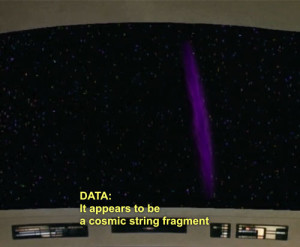
On the bridge, Data detects a cosmic string fragment, which is basically a black hole. The beings around the ship are caught in its pull, thus pulling the Enterprise into it as well – time of impact is in seven hours. They try to use torpedoes to divert the creatures away from the fragment, but it’s ineffective.
Cut to the ready room. Picard tells Troi of the situation with the cosmic string fragment. He says the only way now is to try and communicate with the field; Troi states she will be unable to help because of her current situation. Picard believes she is still the most qualified person for the job because they need to discover the psychology of these creatures to understand what they are doing and why. He asks her to meet up with Data, who is formulating a strategy. I liked that Picard trusted in her human abilities as much as her empath abilities; this is the angle the show should have focused on instead, and not the disability theme.
We move to one hour before they enter the string fragment. Data and Troi are in the observation/meeting room, discussing their current circumstance. Troi doesn’t feel helpful because she doesn’t know how to draw on her human instincts. She says: “Right now, I feel as two-dimensional as our friends out there. In the universe, but barely aware of it. Just trying to survive…on instinct.” That’s a great thing to say to your android friend. By the way, did I mention I love Data? Anyway, she then has a lightbulb moment and wonders if the species are simply acting instinctually, moving toward the string fragment like a moth to a flame.
And now we’re back on the bridge. Data says, if Troi’s theory is correct, an image of the string fragment “projected behind the cluster could induce them to reverse course, disrupting the graviton wake long enough for [them] to escape.” After some failed attempts at this plan and adjustments made, the ship eventually escapes the pull. Damn it! I mean…hooray! However, the beings have resumed their course to the string and eventually enter it – when this happens, Troi looks like she is going to pass out. She waves off help, and says: “It’s all right, they’re home. We were wrong. The cosmic string was never dangerous to them. It was the one place in the galaxy they most wanted to be.” Her empath abilities have returned, and she can go back to being smug. Joy!
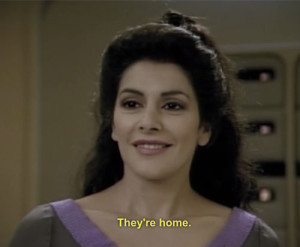
In the final scene, we have Troi, Riker, Guinan, and Crusher talking in Ten Forward. Troi explains that the emotions of the beings must have overwhelmed her senses, creating a short circuit. I understand the explanation, but it seems tacked on, as an aside. She thanks Riker for helping her see her other half, to which he replies: “Welcome to the human race.” What an asshole. End credits!
Overall, this episode sucked. That’s very blunt and not eloquently stated, but listen – even the second plot is weak. 2D fish things? How does that work? Even Picard wonders what the hell, but it’s never explained. And Troi has certainly been overwhelmed with emotions before – what makes this instance so special? I don’t like how the audience is just supposed to accept it. Everything related to disability in this ep is just off, and forced, and (to me) a slap in the face to the actual disability experience.
I went on Memory Alpha (the Star Trek wiki) to look up what people had to say about this ep. Marina Sirtis, the actor who plays Troi, stated: “The handicapped people came up and thanked me. That’s exactly the way they feel, it’s the way I expressed their emotion. ‘The Loss’ was very, very popular” (Captain’s Logs: The Unauthorized Complete Trek Voyages). Did you notice how she clumps disabled people as one unit? “I expressed their emotion” and “that’s exactly the way they feel.” Um, no. I’m sure a few disabled people did go up to her and thank her, but to suggest that’s the way the entire disability community feels is ableist.
Apparently, the writers wanted to make the loss of her empath abilities permanent. One of the writers said: “The bottom line for me was that these shows work because the journey is interesting and that what she learns and what she goes through has to be interesting and involving and, ultimately, educational in that we are showing off the stages of someone who has a serious disability, and what they go through when they are suffering this” (Captain’s Logs: The Unauthorized Complete Trek Voyages). And that’s part of the problem with this episode. You can’t take a complex issue like becoming disabled, cram it into a 42-minute episode where another plot is involved, and expect it to be effective, inoffensive, or educational. It’s simply not going to work. Also, can we not use the word “suffering” when describing disability? It adds to the belief that our lives are not worth living.
So, what did you think? Have you seen this episode? I’d like to hear from you, good or bad, in the comments section. Also, if you have any ideas for other TNG episodes you’d like for me to review, let me know!

like the review and agree with your take on the technical flaws of the story.
How would you, if at all, done a story like this well?
I cant help but think the fact she can exist fine in a world that accomodates her kills it. maybe if the story was about Geordie having to go a prolonged time without use of his visor? would at least show difficulty in navigating a world without a sense. seems odd they wanted to do this episode and forgot they had someone with a disability already on crew (Troi never talks to him about losing a sense, wtf? seems like obvious good place for advice or at least an understanding ear)
Thanks for commenting, ing!
Yeah, that bothered me – for a show that was centered on disability, it’s odd that they completely skipped over Geordi and Troi interaction. Maybe it’s because the writers knew how ridiculous their ideas would appear if they actually got together to talk disability? I mean, could you imagine? TROI: “I’m disabled, now.” GEORDI: *takes visor off* “O RLY?” Like it would just totally fuck with the message they were trying to portray. If they were trying to show us how she ISN’T disabled, then that would have worked.
To improve this ep, I would make it about someone losing a limb, or going with what this episode frequently mentions – losing eyesight. And then have the character REMAIN DISABLED for the rest of the series, no miracle cures. Because I think showing the process of new disability, and showing it realistically, is important. And then having that person’s experiences shown alongside someone’s experiences who has been disabled for a long time would be interesting. Does that make sense? I am really tired, haha.
Makes sense to me. Part of the problem with it is that they have a setting where medicine is basically on the level of curage magic.
If you’re interested in exactly that premise DS9 had a plot thread where a character does lose a leg in war. He gets a good as new replacement (it’s a little unclear whether it’s synthetic or a clowned leg) but there’s still an episode of him going through psychological recovery from the trauma. It’s regarded as generally good, but it does show part of how the setting risks writing out the potential for plausibly writing disability narratives/Aesop.
Wasn’t there an episode where Geordi has to do without his VISOR for a while? I once had a discussion with a blind friend about what that would have been like if Geordi – who was blind from birth and used a VISOR or similar from the age of five – had been contrasted with someone blind from birth or childhood and with the expertise and training of a lifetime living without vision, as my friend had.
There are a few episodes that I’ve seen where Geordi drops/loses his visor, but I’m not sure of any other eps. It would be interesting to see the contrast.
There are episodes where his visor is taken but never one where that’s the core focus.
Great commentary! I especially liked your pictures and captions. I think having Troi recover quickly and miraculously also cheapens the social commentary they were shooting for. they attempt to go down a potentially interesting and important path, screw it up and basically say “never mind, this character would be useless and uninteresting if she was ‘disabled’ so just kidding and HEALED.
Looking forward to more posts
Thanks! I knew you would appreciate my picture captions, haha. I agree, too, about Troi’s miracle recovery cheapening the social commentary.
Excellent post. My husband and I just watched this episode two weeks ago. Even though neither of us are disabled and so we can’t begin to understand what it’s like, we were both frustrated by the episode. What Troy had was an extra ability. It was more like a talented athlete losing their ability to play their sport than it was like a person who lost their sight or hearing or ability to walk. And while it would be terrible to lose a special skill you had, it doesn’t make you disabled. It simply put her on an even playing field with everyone else. She could still do her job. She could still do everything she enjoyed in her life. Her reaction felt out of proportion–like it minimized true disability and the struggles people must go through in order to adjust. I know it would be sad to lose a special ability, but it’s no where near the same as losing an ability that most people have and take for granted. We didn’t feel like this episode and Troi’s character in it was a good representation. I didn’t like the Troi character to begin with and this made me like her less.
Thanks for your comment, Marcy! I agree, it wasn’t a good representation, and the loss of her empath abilities is more akin to someone losing their great singing voice than to, say, losing your actual vocal chords or something. They just totally missed the mark on this episode.
Hey! Great review! I agree with you that the episode didn’t really work, but I’m not sure I agree that it couldn’t have worked. While Troi losing her empath abilities doesn’t seem as huge an issue as they are trying to play it, couldn’t it have been?
I remember reading an article about a woman who had a stroke and lost the ability to see static things (i.e. she could see things in motion but not things that were still) due to the particular regions in her brain which were damaged. She was able to adapt and regain much of her ability to live as a sighted person, but she couldn’t recover facial recognition (as that is a particular center in the brain and it was too damaged). She said that sometimes it really depressed her that she would never see her daughter’s face but other times, she was grateful to see at all.
I feel that they could have played it as something in one sense very survivable but in another sense very hard because she had lost something precious. Maybe they could have shown a friend in the crew who could only communicate telepathically with her, so that now they could not communicate at all, or something else that was more poignant than her counseling sessions, maybe it could have worked. I feel like the audience needed something they could relate to (I mean, none of us are empaths, right?) so that they understood what she meant when she said everyone now looked empty to her. What do you think?
Thanks for the comment!
I like your idea of having someone else on the ship that she could only talk to telepathically. That could have worked – it would have made more sense, at least, when she talked about not “seeing” people anymore. My problem with the episode isn’t necessarily that it was difficult for her to lose her empath abilities, but that they framed it as a disability.
I have to say i find your take on troi’s problem rather hypocritical and ableist of you, I get that troi not being able to sense people is pretty different then being blind or deaf but you seem to forget several things, troi is not fully human, we can’t expect someone who isn’t all human to react well to losing a sense they have always had, like for instance, on wikipedia they list a number of different senses animals have like echolocation or moisture sensing or so on, what if instead there was a person on the ship who used sight and echolocation to find their way around but they lost echolocation and had to use vision, they can see fine but they depend on echolocation for safety and comfort, also i am told about invisible disabilities and troi’s would count, it’s not as visible as other disabilities but it’s still there, I suffer from ptsd, ocd and germaphobia, it’s not easily notable to abled people but it’s there and it affects my day to day life HARD, are my problems not valid because you can’t see it as easily? Magnetoception is a sense birds use to see where they are in the earth’s magnetic field, birds can use their eyes but they also depend on the other sense to fully help them find their way
I completely understand and agree with what you are saying. I was having a conversation with someone the other day about what to do with blog posts I wrote that I don’t entirely agree with anymore. So your comment comes at the perfect time to remind me to add a statement before said posts so folks know where I am now in my thinking about disability. I wrote this five years ago, and have learned and changed a lot in that time (as well as come to terms with my own invisible disability/mental illness). Thank you for your honesty.
Are you still planning to add that note about how your thinking has changed? I read this post in disbelief that you’d missed so much, and was heartened by these last two comments.
Yes, I do plan to write it – it honestly slipped my mind.